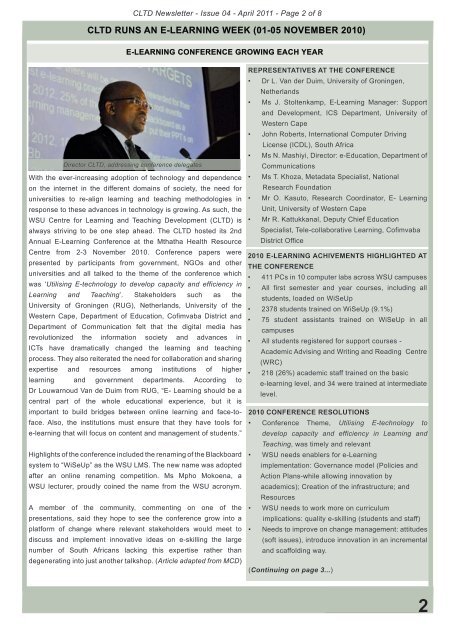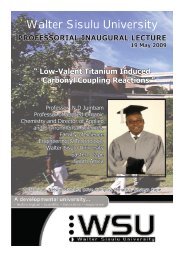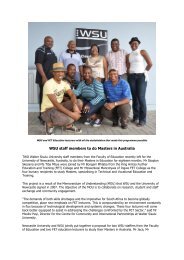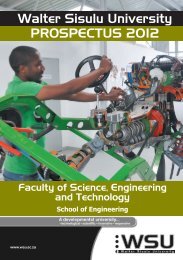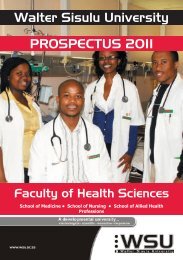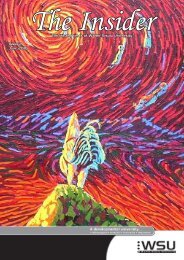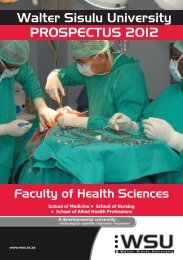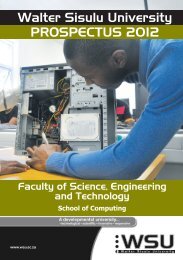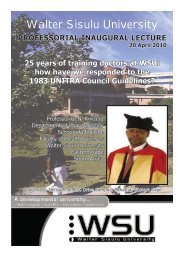Issue 04
Issue 04
Issue 04
Create successful ePaper yourself
Turn your PDF publications into a flip-book with our unique Google optimized e-Paper software.
CLTD Newsletter - <strong>Issue</strong> <strong>04</strong> - April 2011 - Page 2 of 8<br />
CLTD RUNS AN E-LEARNING WEEK (01-05 NOVEMBER 2010)<br />
E-LEARNING CONFERENCE GROWING EACH YEAR<br />
Director CLTD, addressing conference delegates<br />
With the ever-increasing adoption of technology and dependence<br />
on the internet in the different domains of society, the need for<br />
universities to re-align learning and teaching methodologies in<br />
response to these advances in technology is growing. As such, the<br />
WSU Centre for Learning and Teaching Development (CLTD) is<br />
always striving to be one step ahead. The CLTD hosted its 2nd<br />
Annual E-Learning Conference at the Mthatha Health Resource<br />
Centre from 2-3 November 2010. Conference papers were<br />
presented by participants from government, NGOs and other<br />
universities and all talked to the theme of the conference which<br />
was ‘Utilising E-technology to develop capacity and efficiency in<br />
Learning and Teaching’. Stakeholders such as the<br />
University of Groningen (RUG), Netherlands, University of the<br />
Western Cape, Department of Education, Cofimvaba District and<br />
Department of Communication felt that the digital media has<br />
revolutionized the information society and advances in<br />
ICTs have dramatically changed the learning and teaching<br />
process. They also reiterated the need for collaboration and sharing<br />
expertise and resources among institutions of higher<br />
learning and government departments. According to<br />
Dr Louwarnoud Van de Duim from RUG, “E- Learning should be a<br />
central part of the whole educational experience, but it is<br />
important to build bridges between online learning and face-to-<br />
face. Also, the institutions must ensure that they have tools for<br />
e-learning that will focus on content and management of students.”<br />
Highlights of the conference included the renaming of the Blackboard<br />
system to “WiSeUp” as the WSU LMS. The new name was adopted<br />
after an online renaming competition. Ms Mpho Mokoena, a<br />
WSU lecturer, proudly coined the name from the WSU acronym.<br />
A member of the community, commenting on one of the<br />
presentations, said they hope to see the conference grow into a<br />
platform of change where relevant stakeholders would meet to<br />
discuss and implement innovative ideas on e-skilling the large<br />
number of South Africans lacking this expertise rather than<br />
degenerating into just another talkshop. (Article adapted from MCD)<br />
REPRESENTATIVES AT THE CONFERENCE<br />
• Dr L. Van der Duim, University of Groningen,<br />
Netherlands<br />
• Ms J. Stoltenkamp, E-Learning Manager: Support<br />
and Development, ICS Department, University of<br />
Western Cape<br />
• John Roberts, International Computer Driving<br />
License (ICDL), South Africa<br />
• Ms N. Mashiyi, Director: e-Education, Department of<br />
Communications<br />
• Ms T. Khoza, Metadata Specialist, National<br />
Research Foundation<br />
• Mr O. Kasuto, Research Coordinator, E- Learning<br />
Unit, University of Western Cape<br />
• Mr R. Kattukkanal, Deputy Chief Education<br />
Specialist, Tele-collaborative Learning, Cofimvaba<br />
District Office<br />
2010 E-LEARNING ACHIVEMENTS HIGHLIGHTED AT<br />
THE CONFERENCE<br />
• 411 PCs in 10 computer labs across WSU campuses<br />
• All first semester and year courses, including all<br />
students, loaded on WiSeUp<br />
• 2378 students trained on WiSeUp (9.1%)<br />
• 75 student assistants trained on WiSeUp in all<br />
campuses<br />
• All students registered for support courses -<br />
Academic Advising and Writing and Reading Centre<br />
(WRC)<br />
• 218 (26%) academic staff trained on the basic<br />
e-learning level, and 34 were trained at intermediate<br />
level.<br />
2010 CONFERENCE RESOLUTIONS<br />
• Conference Theme, Utilising E-technology to<br />
develop capacity and efficiency in Learning and<br />
Teaching, was timely and relevant<br />
• WSU needs enablers for e-Learning<br />
implementation: Governance model (Policies and<br />
Action Plans-while allowing innovation by<br />
academics); Creation of the infrastructure; and<br />
Resources<br />
• WSU needs to work more on curriculum<br />
implications: quality e-skilling (students and staff)<br />
• Needs to improve on change management: attitudes<br />
(soft issues), introduce innovation in an incremental<br />
and scaffolding way.<br />
(Continuing on page 3...)<br />
2


